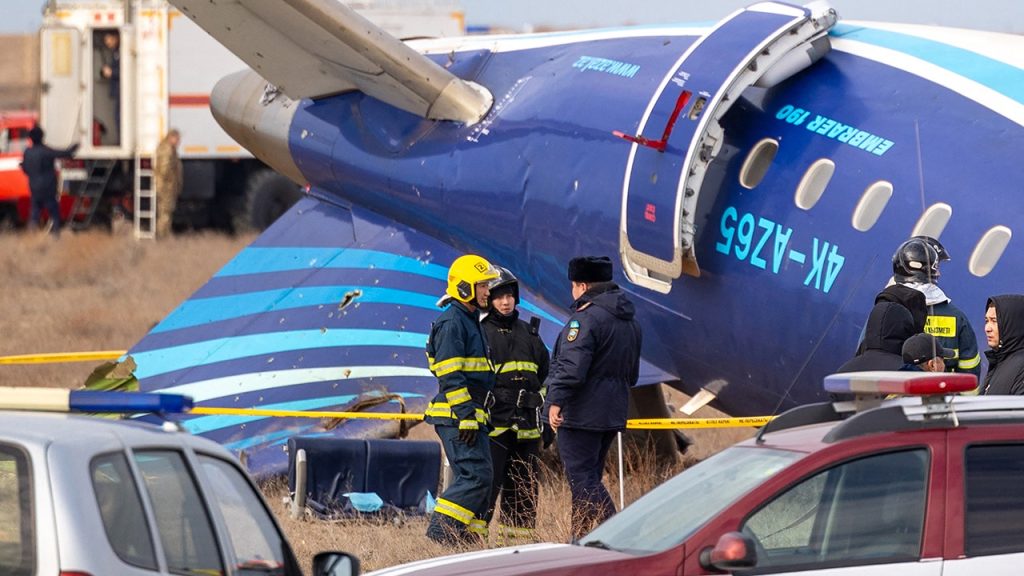The downing of Azerbaijan Airlines Flight J2-8243 on Christmas Day, resulting in the tragic loss of at least 38 lives, has sparked a diplomatic row between Azerbaijan and Russia, with Azerbaijani President Ilham Aliyev accusing Russia of orchestrating an “absurd” cover-up. While Russian President Vladimir Putin offered an apology for the “tragic incident,” the Kremlin has refrained from explicitly acknowledging responsibility for the downing of the passenger jet. This reticence has fueled speculation and heightened tensions between the two nations, despite their historically close ties. President Aliyev, in a pointed statement to state television, expressed his frustration with the initial Russian response, characterizing it as a series of “absurd versions” and “clear attempts to cover up the matter.” This accusation underscores the growing rift between the two countries, even as they maintain close diplomatic relations.
The incident, which occurred amidst ongoing regional conflicts, has been shrouded in ambiguity. While a Kremlin statement indicated that Russian air defenses were engaged with Ukrainian attack drones in the vicinity at the time of the crash, it stopped short of confirming direct Russian involvement in the downing of the Azerbaijani aircraft. This carefully worded statement has done little to quell the growing suspicion and anger within Azerbaijan, and has prompted calls for greater transparency from the Russian authorities. The absence of a clear and unambiguous explanation from the Kremlin has only served to amplify the accusations leveled by President Aliyev, further straining the relationship between the two countries.
The accounts of surviving passengers and crew members paint a vivid picture of the terrifying moments leading up to the crash. Reports of loud bangs followed by erratic aircraft behavior suggest a sudden and catastrophic event. Subhonkul Rakhimov, a passenger who survived the crash, recounted hearing a bang that led him to believe the plane was about to disintegrate. He described the aircraft as behaving as if it were “drunk,” no longer under control. Another survivor, Vafa Shabanova, reported hearing two explosions in the sky prior to the crash. These firsthand accounts, though fragmented and emotionally charged, provide crucial insights into the events that unfolded, further intensifying the demand for a comprehensive and transparent investigation.
The diplomatic fallout from the incident continues to unfold. While President Aliyev and President Putin engaged in a phone conversation following the crash, details of the discussion remain undisclosed. This lack of transparency further fuels speculation and underscores the delicate nature of the situation. The incident puts a significant strain on the historically close relationship between Azerbaijan and Russia, with President Aliyev’s public accusations representing a rare and significant breach of diplomatic protocol. The international community is watching closely as the two nations navigate this sensitive issue.
The downing of the Azerbaijani passenger jet raises critical questions about accountability and transparency in military operations. The lack of a definitive statement from the Russian authorities regarding their role in the incident underscores the need for clear protocols and communication channels to prevent such tragedies in the future. The absence of a clear explanation has left a void filled with speculation and conjecture, further complicating the situation and hindering the grieving process for the families of the victims. The incident serves as a stark reminder of the devastating consequences of miscommunication and the urgent need for greater transparency in military operations.
The ongoing investigation into the downing of Flight J2-8243 is of paramount importance. A thorough and impartial inquiry is essential not only to determine the exact cause of the crash but also to hold those responsible accountable. The international community must ensure that all relevant parties cooperate fully with the investigation to uncover the truth and prevent similar incidents from occurring in the future. The families of the victims deserve answers, and the world needs assurances that such tragedies can be avoided through greater transparency and accountability in military operations. The incident serves as a tragic reminder of the human cost of conflict and the importance of pursuing peaceful resolutions.


